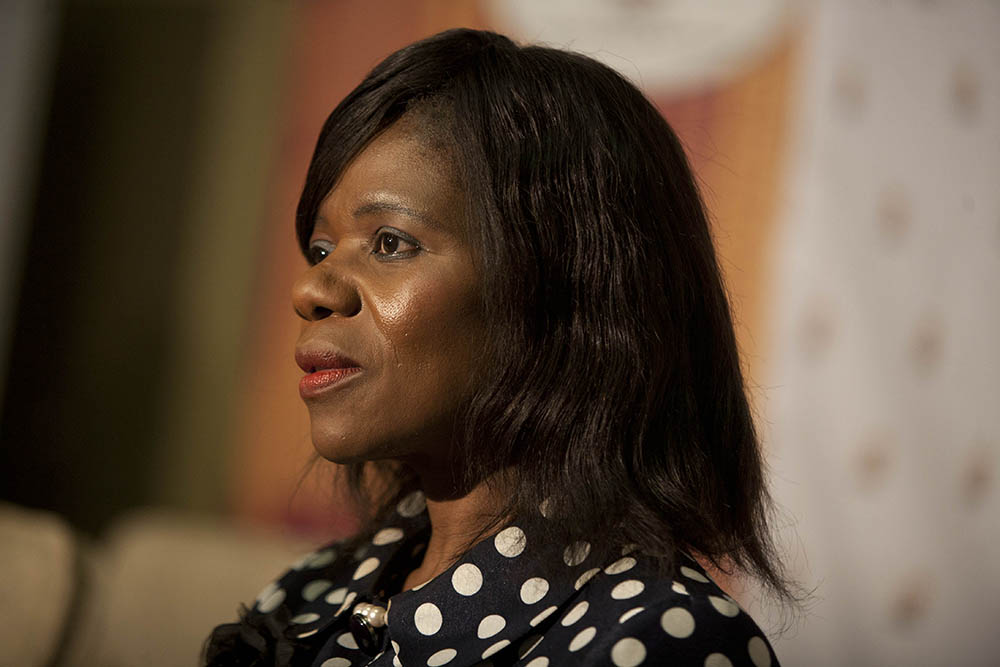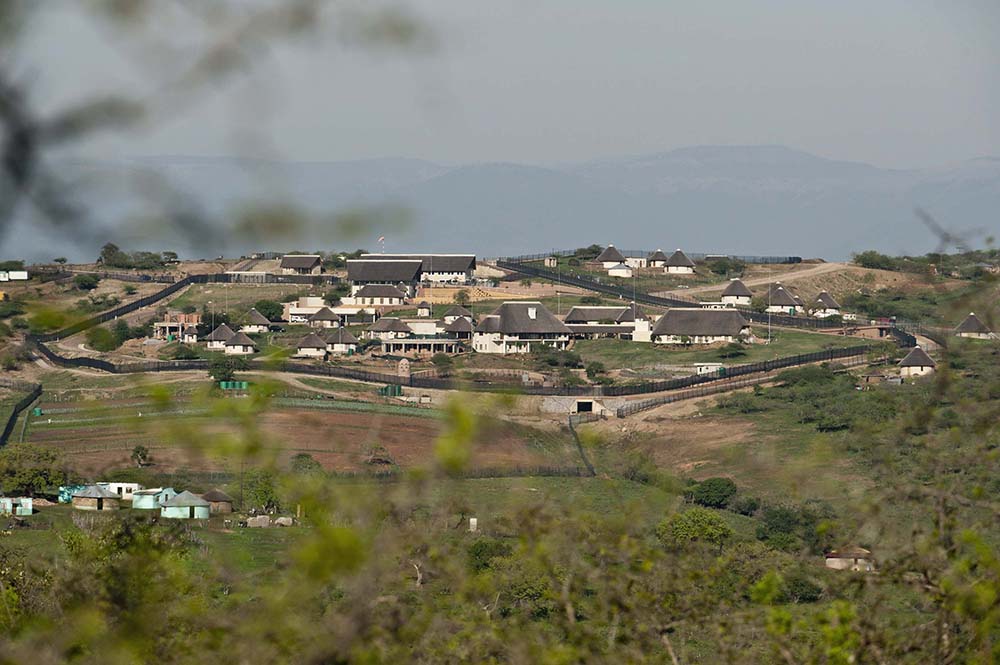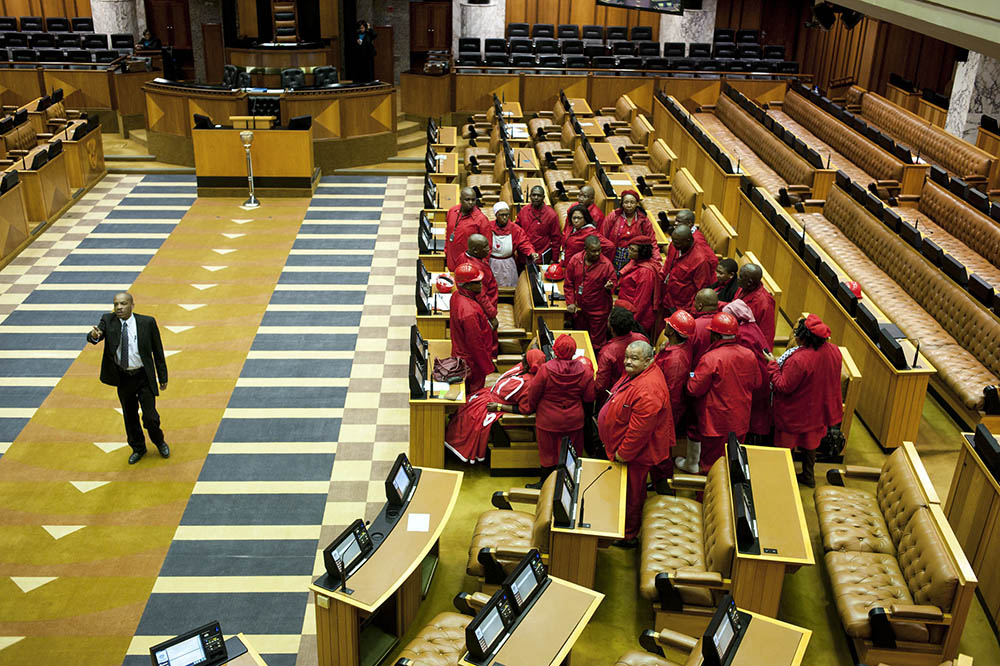The Constitutional Court will decide early this year whether to hear and rule on the bid by the EFF to force Zuma to pay back the money spent on nonsecurity upgrades at Nkandla.
Almost 10 years ago, President Jacob Zuma’s advocate compared his client’s strategic response to the corruption case against him with one of the largest and bloodiest battles in the history of modern warfare: Stalingrad.
The 1942-1943 battle in winter that pitted Russian forces against the Nazi army would be pivotal in determining the outcome of World War II. But it was how that battle was fought that caught the imagination of advocate Kemp J Kemp.
“We will fight them in every room, in every street, in every house,” he said, referring to Zuma’s continuous legal challenges to almost every aspect of the corruption case against him.
It’s now 2016 and the Stalingrad ethos arguably continues to define Zuma’s response to almost every single legal challenge he confronts.
The president will this year face the Democratic Alliance’s long-awaited challenge to the state’s 2009 decision to abandon his corruption prosecution, a protracted legal battle that has been defined by delays and repeated appeals. The action is set to play out in the Pretoria high court on March 1.
Essentially, the legal fights in the so-called spy tapes case were fought in “every street, in every house”. It has been dragging on for seven years. And there are prospects of appeal on both sides, whatever the outcome of the case.
There are also significant doubts over whether, if the DA successfully argues that the decision not to prosecute Zuma was unlawful, the National Prosecuting Authority will then have to institute a case against the president.
In other words, the prospect of delay and complication is almost certain in what is already a complicated and delayed case.
But the spy tapes case arguably won’t be the legal battle the president will be the most concerned about this year.
If the Constitutional Court decides to hear and rule on the Economic Freedom Fighters’ (EFF) bid to force Zuma to “pay back the money” spent on non-security upgrades at his Nkandla residence there are no prospects of appeals and delays.
South Africa’s highest court has agreed to hear the EFF’s application for direct access to it on February 9. This means Julius Malema’s party has a real chance to jump over years of high court and appeal court hearings and make its case that Zuma must act on the recommendations made by the public protector, Thuli Madonsela, in her report on Nkandla.
In a year in which the country decides on its municipal leadership, the potential of an adverse ruling against the president in a case involving the mishandling of public money and a seeming profound lack of political accountability will be of obvious concern to the ruling party – and, possibly, for Zuma too.

Public protector Thuli Madonsela. (Oupa Nkosi, M&G)
The Supreme Court of Appeal made it clear in its ruling on the fate of the SABC chief operating officer, Hlaudi Motsoeneng, that the remedial action recommended by Madonsela cannot be ignored or subverted by so-called parallel processes.
The only way to challenge the public protector’s remedial action was to seek a legal review of the report in which it was made. That means the many investigations, task teams and ad hoc committees set up by Zuma and Parliament in response to the scandal – and Madonsela’s findings on it – do not in any way absolve Zuma from having to act on those recommendations.
Bolstered by that ruling, the EFF hopes to persuade the Constitutional Court that Zuma and the speaker of Parliament, Baleka Mbete, violated their constitutional obligations by not acting on the public protector’s report and want them to be ordered to do so.
Zuma, it seems, is in a corner.
He has responded by accusing the DA and EFF of trying to implicate him, Mbete and Police Minister Nathi Nhleko in a plot to undermine Madonsela, an official he insists he has the utmost respect for.
As he has in many other court cases, Zuma has again cast himself as a victim of political conspiracy.

Zuma’s Nkandla residence in KwaZulu-Natal. (Madelene Cronjé, M&G)
Zuma’s lawyers argue that the DA, EFF and the civil organisation, Corruption Watch – which has been granted permission to address the Constitutional Court on the Nkandla saga – want Madonsela’s report to find the president “guilty” of “some wrongdoing”.
“In fact, it did not – nothing in the PP [public protector’s] report implicates the president in any of the misconduct identified in the report. They also wanted the PP to direct the president to ‘pay back the money’. In fact, on a proper interpretation of the remedial action, there is no such direction,” the lawyers argue in court documents.
In an apparent about-turn, Zuma also suggests the auditor general, Kimi Makwetu, and an “apex official” from the treasury should determine what he should pay – if the court rules against him.
Following the court’s decision to hear the EFF’s application for direct access, the DA is also seeking the opportunity to launch its own attack on Zuma and Parliament’s response to Madonsela’s report.
The DA’s case attacks the appointment of Nhleko to conduct his own investigation of the Nkandla nonsecurity upgrades – and whether they could be defined as improvements for security purposes.
In her report, Madonsela specifically identified the Nkandla chicken coop, cattle kraal, visitors’ centre, amphitheatre and swimming pool as upgrades that had no security purpose, and should therefore be paid for by Zuma.
Her report reveals that the department of public works had identified some of the upgrade work done at the president’s home as “private” and the Special Investigating Unit disclosed that the department’s documents put the costs of this private work at anywhere between R7.9-million and R22-million. The agreed aggregate price of the Zuma family’s private renovations – which were started a year before the so-called security upgrades – is R10-million. There is no evidence that these were ever paid for by the Zuma family.

The EFF hopes to persuade the Constitutional Court that Zuma and speaker Baleka Mbete violated their constitutional obligations by not acting on Madonsela’s report and want them ordered to do so. (David Harrison, M&G)
Madonsela has expressed frustration at Zuma’s repeated refusal to provide proof that he paid for his private renovations with a bond.
“When this investigation started, that was the big story: that there’s a real chance that the private renovations were being funded by the state,” she said in an interview last year. “So it would have helped to confirm that part, that he is the funder.
And then the president’s answer to Parliament was that he got a bond, but the bond was for the original, original renovations, not the ones that started as government started renovating.”
After all the years of drama, name-calling and legal threats that surrounded the Nkandla investigation, do we still not have answers to the question that sparked the probe in the first place?
Madonsela hesitated and then answered, quietly: “No, unfortunately, we do not.”
Her frustration over Nhleko’s investigation, which culminated in a press briefing that exonerated Zuma of any financial liability and featured videos of the swimming pool’s security usage, was, and still is, apparent.
The DA wants Nhleko’s report declared unlawful and invalid, an application that the minister has dismissed as “premature” and “opportunistic”.
It’s in Nhleko’s court papers that it becomes apparent that further legal battles may be fought in Zuma’s Stalingrad war on the Nkandla recommendations. Nhleko hints that parties affected by Madonsela’s report may choose to challenge it in court – and suggests a court may need to determine whether she had “sufficient evidence” before her when she decided that Zuma’s chicken coop and swimming pool were not security features.
Zuma has also stressed that he has the discretion to “take appropriate steps” in response to Madonsela’s remedial action. As always, the president is focusing on room to wriggle.
There is, arguably, a profound irony to the Stalingrad style adopted by Zuma in his response to the Nkandla scandal. Last year Mac Maharaj, his spokesperson at the time, told the Financial Times he had told Zuma to prepare himself to repay some of the money.
“From the beginning, I said to him: ‘President, prepare yourself for repayment’,” Maharaj said. “This was before the report came out. And I said: ‘If you have a problem, I’m sure that in your present position it won’t be difficult to raise [the money]’. He said: ‘No, I did not ask for those security enhancements. I’m not paying’.”
Zuma’s defiance has characterised his response to a scandal that has damaged not only him but also the ANC. Madonsela never dictated what amount he should pay. Paying even the most minimal amount would have prevented the ongoing, and expensive, damage.
Mistaking a call for accountability with a declaration of political violence, Zuma fought in every room, on every street and in every house. Seemingly unable to tell the difference, he turned a skirmish into a war.